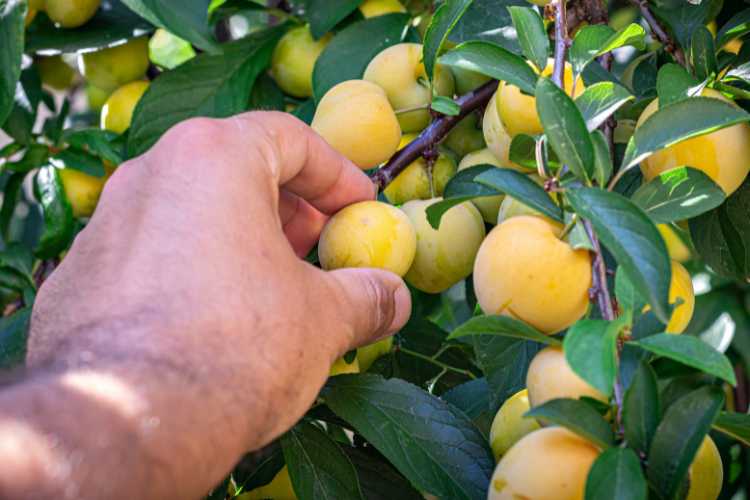Do Patio Trees Produce Fruit?
8th May 2023
Some varieties of dwarf or patio fruit trees produce a bumper harvest year after year. Apples, pears, plums, cherries, and even figs can be grown on the patio. And not only do these types of trees produce impressive yields of fruit they will also brighten up spring with delightful shows of colourful blossoms.
Space saving delights
Long gone are the days when if you wanted a fruit tree you’d end up with a huge apple or pear tree in the corner of the garden. Nowadays, you can have compact trees in containers on your patio. Even a mini orchard in pots.
Patio fruit trees have become so popular now and anyone can enjoy home produced fruit even if they only have a tiny space available for growing.
Making the most of space is one of the attractions of patio fruit trees but certainly not the only reason why you should grab yourself a tree or two.
Container gardening gives you greater flexibility on where you can position your trees. Container-grown trees are generally easier to maintain and certainly easier to prune. You can also have different varieties in a small space giving you greater variety in your garden or on your patio.
Why you should choose fruit trees for your patio
As we’ve mentioned, one of the main reasons that gardeners choose to grow fruit trees on their patio is the space-saving nature of container gardening. Fruit trees planted in the ground need so much space for their root systems and canopy spread.
By contrast of course container-grown fruit trees can be placed in more confined areas, making them ideal for the patio. Even if you are limited to a balcony you can still enjoy homegrown fruit.
Growing fruit trees in containers on the patio gives you a lot of flexibility. Fruit trees need plenty of direct sun and container trees can be moved around to take advantage of sunlight throughout the day.
Also, if you’re not happy with where you’ve placed your tree you can simply move it to somewhere more suitable or attractive to the eye. Not something you can do with that old pear tree you planted in the garden all those years ago.
Also, container gardening allows for better control over the growing conditions including the soil you choose. This should lead to healthier trees and improved fruit production.
Dwarf and miniature fruit trees: The best choice for patios
It won’t be a surprise to you that dwarf and miniature fruit trees are the ideal choice for patio gardening because of their compact growth habits. After all, these trees are specifically bred to have smaller root systems and spread, making them well-suited for life in a container.
Despite being small patio fruit trees still produce an impressive amount of fruit, though you may have to wait until the second season for your first crop.
Patio fruit trees are also generally easier to manage than their full-sized counterparts. It doesn’t take too much effort to prune them and keep them in shape which in turn affects the health of the tree.
Types of fruit trees suitable for patio growing
A wide variety of fruit trees can be successfully grown on the patio, all of them delivering plenty of fruit for you to enjoy.
Apple trees are a popular choice, with many dwarf and semi-dwarf varieties available such as 'Cox's Orange Pippin', 'James Grieve', and 'Egremont Russet' are all great choices for the patio.
Pear trees are always popular with conference and William varieties always growing well. Cherry trees are my personal favourite and I have several on my patio. Plum trees too are a delightful addition to the patio and suitable for containers.
But you don’t have to stick with tradition. Why not consider exotic varieties like fig, medlar, or even nuts? Apricot trees, too, can be grown in containers offering delicious, homegrown fruit on the patio.
Fruit yield comparison: Patio trees vs. ground-planted trees
Patio fruit trees are smaller than those planted in the ground. No surprise there and obviously a large ground-planted pear tree will produce more fruit than a dwarf tree on the patio.
But while patio fruit trees may not yield as much fruit as their ground-planted counterparts, you will still enjoy a nice crop from your patio trees. The trick is to maximise that yield.
The variety of the tree and its rootstock will influence how much fruit it produces as will the size of the container, and the quality of care and maintenance you provide. Dwarf fruit trees are specifically bred to produce fruit in smaller spaces, and as such, can yield impressive harvests despite their compact size.
The size of the container used can also have an impact on how much fruit you can grow. Larger containers provide more room for root growth, which in turn supports a healthier, more productive tree. Making sure the tree is well-watered, fed with balanced nutrients, and is exposed to plenty of sunlight is also crucial for maximising fruit production.
Why you need fruit producing trees on your patio
They look wonderful when in blossom and provide you with fresh fruit. What more needs to be said? And don’t forget that many types of tree, including apples, pears, cherries, plums, and more exotic options like figs and apricots, can thrive on the patio. Even in our wonderful British weather.
10 tips for training your patio fruit trees to produce fruit
1 - Find the right container
There are so many attractive pots and containers available you can choose a really attractive pot for your tree. But looks aren’t everything. Make sure you pick a large, well-draining container with a depth of 18-24 inches. This allows for root growth. The bigger the pot the more stability for the tree.
2 - Pick the right tree
There are so many varieties of fruit trees you can choose from but go for dwarf or semi-dwarf trees which have a more compact growth habit, need less space and are perfect for container gardening.
3 - Use high-quality potting mix
You may have your favourite mix but fill the container with a well-draining, nutrient-rich potting mix that is specifically designed for fruit trees. Takes the guesswork out of getting the nutrients right.
4 - Take care when you’re planting
Plant the tree at the same depth in the new container as it was in its nursery pot. Be sure to leave 1-2 inches of space at the top of the container for mulch.
5 - Water regularly
Watering is always important but is crucial for container-grown fruit trees. Make it a regular routine to check the soil to ensure it doesn’t dry out. Water thoroughly when the top couple of inches of soil feels dry to the touch.
6 - Feed or fertilise
Use a slow-release, balanced fertiliser which has a high level of potassium or feed designed for fruit trees. Make sure you follow the directions on the packaging for application rates.
7 - Pruning and training
Regularly prune and train your fruit tree to maintain a compact shape, encourage branching, and promote air circulation. This will help prevent diseases and allow more sunlight to reach the fruit.
8 - Look out for pests
Pests are… well pests. Keep an eye out for them and if they do turn up treat them straight away with your pest controller of choice.
9 - Keep your tree in the light
Ideally, and British weather permitting, patio fruit trees need at least 6-8 hours of direct sunlight per day. Naturally enough it’s best to place your container in a sunny spot. You can also move the container and tree around to capture more sunlight if necessary.
10 - Bring in the harvest
It’s always tempting to pick the fruit especially when those pesky birds are flying with your cherries. But be patient and wait for the fruit to fully ripen before harvesting.
Check out the full range of fruit trees fresh from the nursery.


